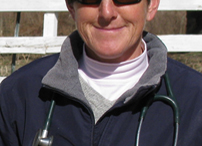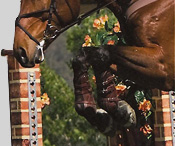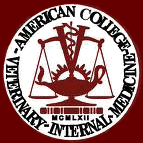




Just like you, I dread the thought that one of my horses may show signs of colic one day. I spent 4 years studying equine colic completing my PhD research, I accepted literally hundreds of colic emergencies into the hospital during my clinical residency, and I now have 20+ years experience treating colic in the field. And still, I can’t guarantee that your horse with colic will not experience a serious complication.
Treating colic can be expensive. A routine after hours colic call in my practice costs about $250. This includes an emergency call fee, physical exam and rectal palpation, sedation, medication to reduce pain and enhance gastrointestinal motiliy , and nasogastric intubation. About 80% of horses recover uneventfully after a single visit, if that visit occurs within the first hour of onset of signs. More serious cases, or those in which initial treatment is delayed, can require multiple visits or warrant hospitalization. Complicated medical cases and surgical colics can cost $6000-$10,000. Early intervention is the key to successful treatment. So what can YOU do to help ensure that your horse recovers from a colic episode and save money at the same time? Be observant, and learn to do a basic physical examination! Get a cheap stethoscope at the local nursing supply store. Buy a digital thermometer at the drug store. And then ASK ME to teach you during your fall clinic appointment. How many of you “experienced horsemen” know how to do a physical??
If you can get temperature, pulse , respiration, and evaluate gut sounds and oral mucous membranes you can convey critical information on your first call to me at the onset of signs of colic. High heart rate, no gut sounds, and escalating pain indicate the need for intensive veterinary treatment. In milder cases, after we review your clinical findings it may be reasonable for you to administer medication orally to your horse. Discuss the option of having oral Banamine paste on your property with me. When I evaluate your colicky horse, in addition to history and physical exam findings, I will perform a rectal palpation and pass a stomach tube. This will provide me with information that you cannot obtain which will guide specific treatment decisions.
Until I teach you how to do a complete physical examinantion, here are the basics:
• What to watch for (in order of severity):
➢ Poor appetite
➢ Reduced manure production
➢ Lying down more than normal
➢ Stretching out as if trying to urinate
➢ Pawing, getting up and down, looking at flank
➢ Rolling violently
• What to do:
➢ CALL YOUR VETERINARIAN IMMEDIATELY
➢ Take food away
➢ Walk your horse if he attempts to lie down/roll
Colic is serious, but in most cases treatable. When a serious colic strikes, it happens very quickly. I urge you to think ahead – establish a savings account for your horses if you can, look into equine medical insurance and Care Credit (CareCredit.com), and decide now how much you can afford to spend in a critical situation. Planning in advance makes those difficult decisions a little easier in times of crisis.
Take advantage of your fall clinic appointment to ask me more specific questions about colic prevention and treatment, and to get your physical exam training!
PO BOX 60730
RENO NV 89506
EMERGENCY (775) 742-2823 OFFICE (775) 969-3495
FAX (775) 969-3923








